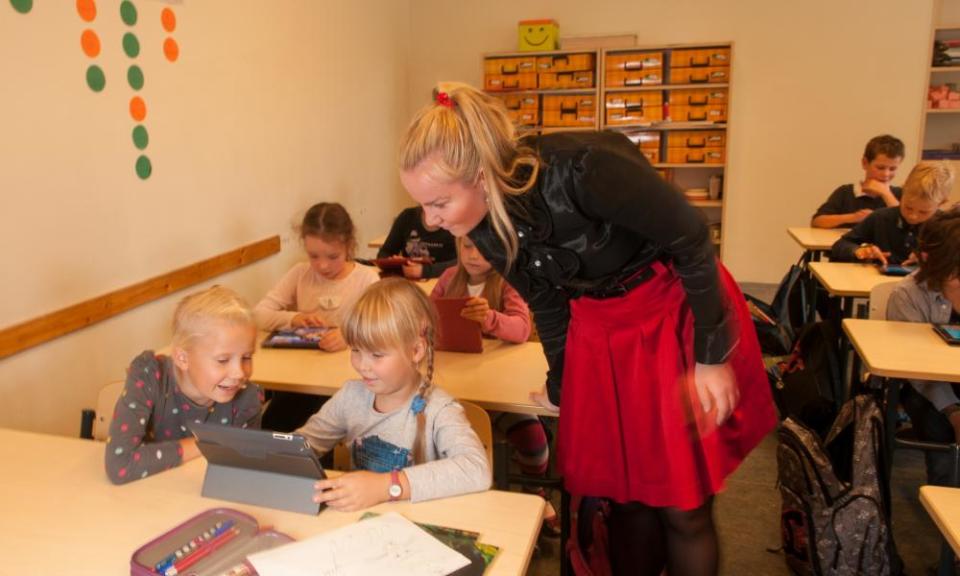Lessons from Estonia: why it excels at digital learning during Covid

As hundreds of thousands of children in the UK found themselves shut out of education during lockdown, without access to a laptop or internet, pupils in Estonia reaped the rewards of the Baltic country’s long-term investment in digital learning.
Long before coronavirus began to wreak havoc on the world, Estonia made the development of digital skills, high-speed internet and a sophisticated IT infrastructure a national priority. In 2001, it was one of the first countries in the world to classify internet access as a human right.
Estonian schools have been using digital study materials and electronic school management systems for years, so when the pandemic hit and schools were forced to close in Tallinn, Estonian children went home where their studies moved seamlessly online.
In the UK, by contrast, online education during lockdown was patchy, with children’s learning determined mainly by digital access. Teachers have had to rapidly develop new digital skills, and the government’s laptop scheme to provide kit to disadvantaged children in England has been criticised as too little, too late.
“It has not been a piece of cake,” said Taavi Kreitsmann, a headteacher in Estonia. “But in many ways we are definitely in a more fortunate situation than others.” Kreitsmann is the head of Tartu Erakool, a school for seven– to 13-year-olds in Tartu, a city in the east of the country.
Way before Covid, all 340 students at Kreitsmann’s school had their own iPads, centrally managed by the school and used routinely to deliver and learn lessons, and children were used to occasional online study days, where they worked from home rather than in the school building while their teachers were involved in other tasks.
Admittedly, Tartu Erakool is private and may be better equipped than other schools, but since Estonia gained independence from the Soviet Union in 1991, the country’s ambitious young leaders have thrown themselves into the challenge of creating a digital state, with education at the heart of their plans.
In 1997, a project called Tiigrihüpe (the Tiger Leap) was launched to provide computers and internet access for schools, and vital digital training for teachers. “Estonia has been preparing for digital education for years,” said Laura Limperk-Kütaru, the head of Estonia’s international relations department. “For us this transformation to distance learning was not something new.”
Before the pandemic, most Estonian schools were routinely using digital study materials, including a platform of digital books called Opiq and electronic school management systems such as eKool, which connect pupils, parents and teachers. “All these systems have been set up for years now,” said Limperk-Kütaru. When Covid closed school buildings, “it was just moving from classrooms to a virtual environment”.
Not every child in Estonia had access to a laptop or tablet, but where they did not, schools, local authorities and voluntary organisations stepped in. A team of university-trained “educational technologists” who are based in schools worked with teachers to ensure the best use of digital resources.
The results so far are positive. “Teachers at schools were able to reach out to almost all children,” said Limperk-Kütaru, who is confident there has not been significant learning loss. “Currently we have not seen much difference from other years.” In England, there are fears that 10 years of progress in narrowing the attainment gap between disadvantaged pupils and their peers may have been wiped out by Covid.
Estonia has not only done well during lockdown, it has established itself in recent years as the new education powerhouse of Europe, outperforming even Finland in the international Pisa tests. With a population of just 1.3 million, the educational challenges Estonia faces are very different from those in the UK, but its digital success may hold lessons for other countries.
Andreas Schleicher is the head of education and skills at the Organisation for Economic Co-operation and Development, where he also oversees the international Pisa tests. Asked why Estonia’s move to remote learning has been so successful compared with the UK’s, he said: “The key difference is that teachers and school leaders in Estonia are used to working as designers of innovative learning environments, and have great flexibility on how to best configure the people, the spaces, the technology and times in their respective context.
“It goes back to when Estonia became independent. Unlike other countries in the region, they didn’t try to restore the old system but had a young generation of entrepreneurs create an entirely new public system with entrepreneurship and digitalisation at its heart.”
The pandemic has reinforced Estonia’s commitment to digital education, and with disruption to school-based education likely to continue, other countries will follow suit. “Many things will never be the same again,” said Kreitsmann, “and education is one of those things.”

